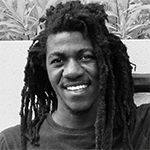homeland
the spot I’m from
the lot where wounds bloom
to pry open space
voice clenched inside the stone
and waiting for fresh water
my wind slinks out of the tree
to delta into vertigos
how can I arrive at different rivers
what weather can I yank the stitch of rain out of for my land
north-large-whole south-little-hole
noise-that-matters voice-in-tatters
piddling class
crossed this world that’s hacked into nations
have cut my paws to chuck
homeland I’ve looked for you with no luck
I’ll have to invent you
you rattle my arteries
are more present than the spliff at my lip
warmer than the lover against my skin
but the world walls up shudders
won’t raise the gate of your residence for me
neither more nor less advanced
in equal step with humanity
my country won’t reach the heights of the grand powers
but will share its ladder
red bird rage-lark
there will be blue sky for a river fresh cry for a mouth
a white season for weapons
I will be born in this country
bulrush-ministry
parliament-of-mourning-doves
pays mien
du point je suis
d’où fleurissent plaies
à fracturer l’espace
voix fermée dans la pierre
en attente d’eau fraîche
mon vent se détache de l’arbre
pour ramifier vertiges
comment atteindre d’autres fleuves
de quel temps extraire pluie pour ma terre
nord-grand-entier sud-petit-tiers
bruit-qui-compte voix-sous-bottes
basse moyenne
ai traversé monde que voici taillé en pays
me suis coupé les pattes
pays mien je te cherche en vain
il faut t’inventer
tu secoues mes artères
plus présent que le chanvre à ma lèvre
plus chaud que l’amoureuse contre ma peau
mais le monde mur autour des convulsions
me refuse où te domicilier
ni plus avancé ni moins avancé
à pas égal avec l’humain
mon pays n’ira pas aux sommets des grandes puissances
mais partagera sons échelle
oiseau rouge rage-allumette
ce sera bleu ciel pour rive cri frais pour bouche
saison blanche pour les armes
je naîtrai dans ce pays
ministère-roseau
parlement-tourterelle
branch
deadended clouds
the frail dolls of morning latch on
to the airlift
each dive
drops the heart back into its childhood
what branch shudders
so ecstatically a wing will not devour it
oblivion
the hanger I hang the flags from
so I can offer the alms of my hand
behind each being a sheet glows
here I am without markings
the sea is no mast
cyclonic gown
footing slipshod in your floods
in your rains I remain dry
what a revel
if I open my window
it’s because you are a pledge
branche
nuages en impasse
poupées frêles les matins s’attachent
à la fuite
toute chute
ramène le cœur à son enfance
quelle branche jouit
si folle une aile ne la dévore
oubli
cintre où j’accroche drapeaux
pour donner ma main en offrande
derrière chaque être luit une voile
me voici sans empreinte
la mer n’est pas un poteau
robe au cyclone
perdre pied dans vos déluges
dans vos pluies m’étancher
quelle fête
si j’ouvre ma fenêtre
c’est que vous êtes une promesse
am I poor
burned up, my newborn blood
grew up inside a lack
limb too much for the body to lift
my mother chopped down sugarcane
bum harvest for the History
that played dumb in the scholarly account
my flesh still mulls the slash
the historian filed away in the void
nowadays am I poor
don’t reach for your abacus
every tax to keep me quiet settled
my shame fully paid up
and I’ve still got a couple gobs
to lob into the brimming evening of your capital
suis-je pauvre
brûlé mon sang nouveau-né
ai grandi dans le manque
membre trop lourd pour le corps
ma mère a coupé la canne à sucre
nulle récolte pour l’Histoire
foutue muette dans le conte scolaire
ma chair rumine encore l’amer
que l’historien a archivé dans l’oubli
maintenant suis-je pauvre
n’attrape pas ta machine à calculer
acquittée toute taxe de me taire
dépensée ma honte
il me reste ces quelques crachats
à jeter dans la nuit pleine de ton capital
finished off
coming for the lack
coming in pieces
hyphen closing the road
murk-made animal coming for sleep
throat slashed deep
sown in rafts at my feet
a strait the tributary limps into
my head the fogs skirt past
bowed the word grows brittle
the next step dust
the gardens darkness locks belong to me
I’m on my way to be finished off in daylight
achevé
viendrai pour l’absence
viendrai cassé
trait à fermer route
animal ténèbre viendrai au sommeil
gorge décapitée
semée en radeaux à mes pieds
étroitesse où s’épuise branche
contournent ma tête les brumes
arqué le mot s’effrite
poussière prochain pas
à moi jardins clos par l’opacité
je viendrai achevé au jour
Jean D’Amérique, Atelier du silence. Cheyne éditeur, 2020.
© Cheyne éditeur, all rights reserved.
Translator’s Note:
These four translations come from Jean D’Amérique’s third collection of poems, Atelier du silence or The Workshop of Silence. D’Amérique is a prolific writer with an exceptionally well-tuned ear (honed by his early years in the slam poetry scene) and a rigorous and unflinching moral outlook. It would be an oversimplification to say that his poems are about Haiti, the nation of his birth and upbringing, and the political, economic, and cultural situation therein, but it would be a disservice to pretend they are not deeply concerned with it. When we see a poem like “homeland,” where the speaker has to “invent” where he is actually from, a poem that makes a government out of the natural elements and beauty that surround him, we come close to understanding the aspect of Haiti that animate him—the land itself, the origins of its songs and sounds and scents: bulrushes, larks, mourning doves.
In D’Amérique’s poetry, there is a dexterous ambivalence towards what others tend to take for granted—the kind of ambivalence that allows poetry to flourish. A nation, D’Amérique tells us, isn’t just its government, nor is it only its people. A language isn’t a simple tool but one inflected with history and still spattered with blood and injustice, as well as a material to be melted down, recast, wielded in new and surprising ways. The subject matter here is heavy—poverty, natural disaster, the first country to truly abolish slavery being shoved off the world stage for centuries—though the poems themselves are often unassuming and small on the page; we might go so far as to say that this is a kind of formal imitation of the nation’s geographic size and outsized historical/experiential weight.
But just as Haiti is more than its history and its geopolitical status, and just as D’Amérique is more than his passport, these poems bristle with surplus—consonance and puns, tenderness and anger, meditations on the nature of poetry and music and scathing indictments of regimes. His poetry abounds, and in its abundance resists the kinds of shortsighted, divisive categorizations that seek to reduce the world’s complexity so it can be more easily fenced.

Born in Haiti in 1994, Jean D’Amérique is a prize-winning poet, playwright, and novelist who splits his time between Paris, Brussels, and Port-au-Prince. He has published several collections of poetry: Petite fleur du ghetto (Atelier Jeudi Soir), Nul chemin dans la peau que saignante étreinte (Cheyne), Atelier du silence (Cheyne); and Rhapsodie rouge (Cheyne). Author of several plays, he has received the Prix Jean-Jacques Lerrant des Journées de Lyon des Auteurs de Théâtre for Cathédrale des cochons (éditions Théâtrales) and the 2021 Prix RFI Théâtre for Opéra poussière. His first novel, Soleil à coudre, is out now from Actes Sud.

Conor Bracken is a poet and translator. He is the author of Henry Kissinger, Mon Amour (Bull City Press) and The Enemy of My Enemy is Me (Diode Editions), and the translator of Mohammed Khaïr-Eddine’s Scorpionic Sun (CSU Poetry Center) and Jean D’Amérique’s forthcoming No Way in the Skin Without This Bloody Embrace (Ugly Duckling Presse). He lives near Cleveland, Ohio. Translator photo by Lupita Eyde-Tucker.

 BACK TO ISSUE
BACK TO ISSUE